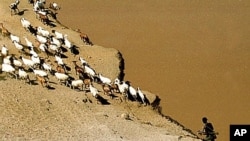Scientists say agriculture must be a key focus in confronting the effects of climate change.
Agricultural experts at the climate conference in Durban, South Africa, say this year's meeting offers a unique opportunity to address the role of agriculture in reducing the effects of greenhouse gas emissions.
“If you look at the projections for climate change, the worst hit is going to be Africa,” said Bruce Campbell, director of the Research Program on Climate Change, Agriculture and Food Security for the Consultative Group on International Agricultural Research (CGIAR).
“Even if you look at what’s happening today in terms of the numbers of disasters, numbers of floods, numbers of droughts, it’s already being felt in Africa,” he said.
Campbell, who’s attending the conference, said climate change is wiping out crops and livestock.
But he said a variety of solutions are being discussed at this year’s meeting, as are many small-scale success stories.
“What one wants to do is scale up on the successes. For example, there’s risk insurance; it ensures farmers against calamities. There [are] improved weather advisories so farmers have a better idea before the season starts, and then they can make wise decisions about whether they invest in fertilizer,” said Campbell.
There are also techniques like “conservation agriculture” in southern Africa, where already 250,000 Zambian farmers are benefitting from more soil fertility, improving yield and at the same time putting carbon back into the soil.
Agriculture production contributes about one-third of global greenhouse gas emissions. Half of these are direct emissions from agriculture itself. “For example, fertilizer application results in nitrous oxide.
The other half is from the impact of agriculture on forests, where [they] are cleared for agriculture use,” said Campbell.
In the case of fertilizer, the nitrous oxide released can be reduced by using the smallest effective amount and carefully targeting its application.
Campbell added that by applying these techniques and technologies, agricultural production can be improved and pollution reduced.
Click on audio to hear entire interview.




